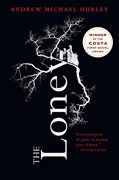The Loney
Andrew Michael Hurley
book reviews:
· general fiction
· chick lit/romance
· sci-fi/fantasy
· graphic novels
· nonfiction
· audio books
· author interviews
· children's books @
curledupkids.com
· DVD reviews @
curledupdvd.com
newsletter
win books
buy online
links
home
for authors
& publishers
for reviewers

 |
The Loney Andrew Michael Hurley Houghton Mifflin Harcourt Hardcover 304 pages May 2016 |
|
Beyond the threat of “things that go bump in the night,” Hurley’s novel isn’t nearly as horror-themed as its cover (and as Stephen King) might suggest. There is still lots to like about this story of two brothers and their Easter pilgrimage to The Loney, a strange and ominous stretch of the English coastline: a “nowhere place between the Wyre and the Lune.” The brothers are young, mute Hanny and our narrator, “Tonto.” They travel to The Loney with their Mummer and Father, co-parishioners Mr. and Mrs. Belderboss and Miss Bunce, and their new parish priest, Father Bernard McGill, who is charged with spiritually and emotionally guiding them.
At first light on Tuesday of Holy Week, the parishioners leave London on a minibus driving North through the East Midlands, heading for the Moorings. The place has a reputation for being repeatedly abandoned, broken and dilapidated. The Loney is a dangerous, wild place; there’s an inevitability about its cruelty. That notion is not lost on the parishioners, who seem unnerved by the sudden mist, the thunder over the sea, and the wind scurrying along the beach. Hurley writes of this landscape well, exhibiting an easy familiarity with a place haunted by time, a place that adds depth to Hanny and Tonto’s days as they explore the marshes and the sand dunes: “now I was here and walking across the marshes with Hanny it all seemed to unfold as it should be and the real world, the world as it should be, is the one that was buried in London.” In the midst of the wind and rain and sea, “always freshly born and feral,” the boys play in the pillbox, an old bunker that can easily be transformed into a hideout. From voices heard late at night (the shouting and whooping “like a war dance”) to the wind that blusters the Moorings, Hurley creates a steady sense of menace culminating in the bare-bulge of Coldbarrow peninsula and Thessaly, an ancient old stone house that sits at Coldbarrow’s northern tip. Rumor has it that the house is haunted by a beautiful witch called Elizabeth Percy who once lured sailors onto the rocks. Percy’s story is just one of the many superstitions the local people still cling to out of conviction. Currently staying at Thessaly are a young couple and a pregnant girl. The father, Lawrence, unapologetically offers a warning to the boys to stay well away, “this is a dangerous place and it’s easy to misjudge things.” As the weekend unfolds, Father Bernard conducts late-night confessionals on which Tonto attempts to eavesdrop. Tension is added with a couple of menacing, gun-toting local men suspected of hanging something gruesome in the woods in order to scare the group away. Miss Bunce descends into hysteria; poor, frail Mr. Belderboss is also unnerved by the noises at night. Every knock and creak of the Moorings brings Tonto back from the edge of sleep, causing him to reflect on his time as an altar boy and how his young friend Henry unwittingly became “the sinner” and whipping boy for an abusive Father Wilfred. These recollections of Tonto’s young religious life form the narrative core of the novel. So do Hanny’s deeply reflective memories of that Easter weekend where a beach, a girl, and an old house with ravens contribute to the sense that he and his brother were left in a cellar, trapped and frightened. While the pivotal theme of The Loney Originally published on Curled Up With A Good Book at www.curledup.com. © Michael Leonard, 2016 |
| Also by Andrew Michael Hurley: |
|
|
|
 Click here to learn more about this month's sponsor! |
|
| fiction · sf/f · comic books · nonfiction · audio newsletter · free book contest · buy books online review index · links · · authors & publishers reviewers |
|
| site by ELBO Computing Resources, Inc. | |
 Recently relocated to London’s Saint Jude’s parish, charming Father Bernard is a somewhat controversial substitute brought in to replace Father Wilfred, who died suddenly in mysterious circumstances. Father Wilfred’s sermons raved about the ubiquitous evils of the world, and Mummer--caught in a perpetual evangelical frenzy--is keen that Father Bernard repeat Wilfred’s traditions. Ostensibly heading to The Loney for
a week of penitence and prayer during which the parishioners can make their full confessions, Mummer’s prime mission is to get Hanny to drink the water at “the Shrine,” a sacred place rumored to be steeped in the power of Jesus. Mummer is hopeful the water will cleanse Hanny’s body and “drive out the sickness” that has kept him silent since the day he was born.
Recently relocated to London’s Saint Jude’s parish, charming Father Bernard is a somewhat controversial substitute brought in to replace Father Wilfred, who died suddenly in mysterious circumstances. Father Wilfred’s sermons raved about the ubiquitous evils of the world, and Mummer--caught in a perpetual evangelical frenzy--is keen that Father Bernard repeat Wilfred’s traditions. Ostensibly heading to The Loney for
a week of penitence and prayer during which the parishioners can make their full confessions, Mummer’s prime mission is to get Hanny to drink the water at “the Shrine,” a sacred place rumored to be steeped in the power of Jesus. Mummer is hopeful the water will cleanse Hanny’s body and “drive out the sickness” that has kept him silent since the day he was born.